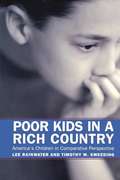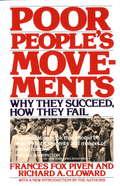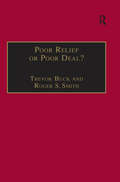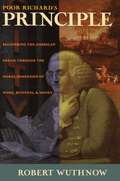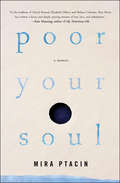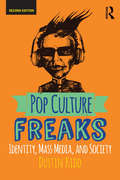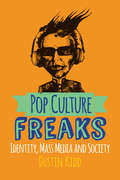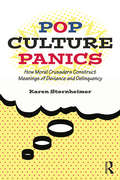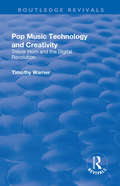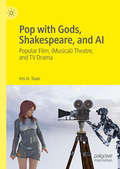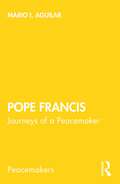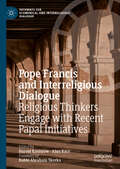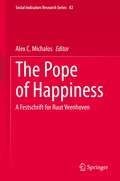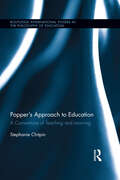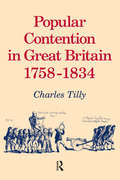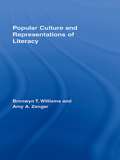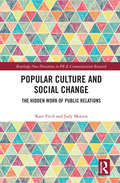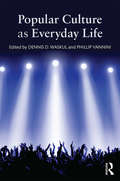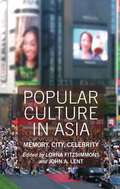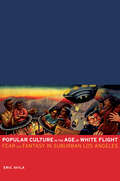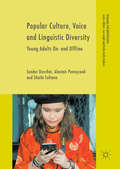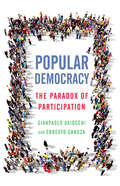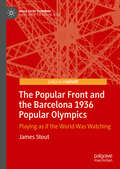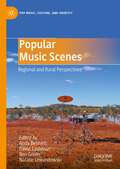- Table View
- List View
Poor Kids In A Rich Country: America's Children In Comparative Perspective
by Lee Rainwater Timothy M. SmeedingIn comparing the situation of American children in low-income families with their counterparts in other wealthy countries, Lee Rainwater and Timothy M. Smeeding provide a powerful perspective on the dynamics of child poverty in the United States.
The Poor Pay More: Consumer Practices of Low-Income Families
by David CaplovitzHas delineated with uncompromising, scientific evidence the brutal economic facts of existence for a group of low-income families in four New York City housing projects.
Poor People's Movements
by Frances Fox Piven Richard ClowardHave the poor fared best by participating in conventional electoral politics or by engaging in mass defiance and disruption? The authors of the classic Regulating The Poor assess the successes and failures of these two strategies as they examine, in this provocative study, four protest movements of lower-class groups in 20th century America:-- The mobilization of the unemployed during the Great Depression that gave rise to the Workers' Alliance of America-- The industrial strikes that resulted in the formation of the CIO-- The Southern Civil Rights Movement-- The movement of welfare recipients led by the National Welfare Rights Organization.From the Trade Paperback edition.
Poor Relief or Poor Deal?: The Social Fund, Safety Nets and Social Security (Studies in Cash & Care)
by Trevor BuckThe social fund has been a controversial instrument of social policy in the UK since its introduction in 1988. This book brings together new research and debate on the role and effect of the social fund in relieving poverty, and introduces evidence from the wider European field to allow comparison to be made with other countries' experience of providing a 'safety net' for their poorest citizens. This book opens up for wider discussion the question of how to provide help for disadvantaged groups and individuals at times of financial crisis. Addressing practical questions about how such schemes work (or fail to work) effectively, the book also provides the basis for more general consideration of the overall objectives which they are expected to meet. This will contribute to new thinking about the policy goals of the social fund and other emergency payment schemes, and their role in meeting broader aspirations such as cohesion, inclusion and social justice.
Poor Richard's Principle: Recovering the American Dream through the Moral Dimension of Work, Business, and Money
by Robert WuthnowThe American Dream is in serious danger, according to Robert Wuthnow--not because of economic conditions, but because its moral underpinnings have been forgotten. In the past this vision was not simply a formula for success, but a moral perspective that framed our thinking about work and money in terms of broader commitments to family, community, and humanitarian values. Nowadays, we are working harder than ever, and yet many of us feel that we are not realizing our higher aspirations as individuals or as a people. Here Wuthnow examines the struggles in which American families are now engaged as they try to balance work and family, confront the pressures of consumerism, and find meaning in their careers. He suggests that we can find economic instruction and inspiration in the nation's past--in such figures as Benjamin Franklin, for instance, who was at once the prudent Poor Richard, the engaged public person, and the enthusiastic lover of life. Drawing on first-hand accounts from scores of people in all walks of life and from a national survey, the book shows that work and money cannot be understood in terms of economic theories alone, but are inevitably rooted in our concepts of ourselves and in the symbolic rituals and taboos of everyday life. By examining these implicit cultural understandings of work and money, the book provides a foundation for bringing moral reasoning more fully to bear on economic decisions. It re-examines the moral arguments that were prominent earlier in our history, shows how these arguments were set aside with the development of economistic thinking, and suggests their continuing relevance in the lives of people who have effectively resisted the pressures of greater financial commitments. Demonstrating that most Americans do bring values implicitly to bear on their economic decisions, the book shows how some people are learning to do this more effectively and, in the process, gain greater control over their work and finances. At a time when policymakers are raising questions about the very survival of the American dream, Poor Richard's Principle offers an analysis of how moral restraint can once again play a more prominent role in guiding our thinking.
Poor Your Soul: A Memoir
by Mira PtacinPoor Your Soul--moving, wise, and passionately written--is a beautiful reflection on sexuality, free will, and the fierce bonds of family.At twenty-eight, Mira Ptacin discovered she was pregnant. Though it was unplanned, she embraced the idea of starting a family and became engaged to Andrew, the father. Five months later, an ultrasound revealed that her child would be born with a constellation of birth defects and no chance of survival outside the womb. Mira was given three options: terminate the pregnancy, induce early delivery, or wait and inevitably miscarry.Mira's story is paired with that of her mother, who emigrated from Poland to the United States, and who also experienced grievous loss when her only son was killed by a drunk driver. These deftly interwoven stories offer a picture of mother and daughter finding strength in themselves and each other in the face of tragedy.From the Hardcover edition.family, human sexuality, and free will.From the Hardcover edition.
Pop Culture Freaks: Identity, Mass Media, and Society
by Dustin KiddUtilizing each chapter to present core topical and timely examples, Pop Culture Freaks highlights the tension between inclusion and individuality that lies beneath mass media and commercial culture, using this tension as a point of entry to an otherwise expansive topic. He systematically considers several dimensions of identity—race, class, gender, sexuality, disability—to provide a broad overview of the field that encompasses classical and contemporary theory, original data, topical and timely examples, and a strong pedagogical focus on methods. Pop Culture Freaks encourages students to develop further research questions and projects from the material. Both quantitative and qualitative analyses are brought to bear in Kidd's examination of the labor force for cultural production, the representations of identity in cultural objects, and the surprising differences in how various audiences consume and use mass culture in their everyday lives. This new, revised edition includes update examples and date to reflect a constantly changing pop culture landscape.
Pop Culture Freaks
by Dustin KiddLove it or hate it, popular culture permeates every aspect of contemporary society. In this accessibly written introduction to the sociology of popular culture, Dustin Kidd provides the tools to think critically about the cultural soup served daily by film, television, music, print media, and the internet. Utilizing each chapter to present core topical and timely examples, Kidd highlights the tension between inclusion and individuality that lies beneath mass media and commercial culture, using this tension as a point of entry to an otherwise expansive topic. He systematically considers several dimensions of identity-race, class, gender, sexuality, disability-to provide a broad overview of the field that encompasses classical and contemporary theory, original data, topical and timely examples, and a strong pedagogical focus on methods. Pop Culture Freaks encourages students to develop further research questions and projects from the material. Both quantitative and qualitative analyses are brought to bear in Kidd's examination of the labor force for cultural production, the representations of identity in cultural objects, and the surprising differences in how various audiences consume and use mass culture in their everyday lives.
Pop Culture Panics: How Moral Crusaders Construct Meanings of Deviance and Delinquency
by Karen SternheimerMoral panics reveal much about a society’s social structure and the sociology embedded in everyday life. This short text examines extreme reactions to American popular culture over the past century, including crusades against comic books, music, and pinball machines, to help convey the "sociological imagination" to undergraduates. Sternheimer creates a critical lens through which to view current and future attempts of modern-day moral crusaders, who try to convince us that simple solutions—like regulating popular culture—are the answer to complex social problems. Pop Culture Panics is ideal for use in undergraduate social problems, social deviance, and popular culture courses.
Pop Music: Technology and Creativity - Trevor Horn and the Digital Revolution (Ashgate Popular And Folk Music Ser.)
by Timothy WarnerThis title was first published in 2003.This highly original and accessible book draws on the author’s personal experience as a musician, producer and teacher of popular music to discuss the ways in which audio technology and musical creativity in pop music are inextricably bound together. This relationship, the book argues, is exemplified by the work of Trevor Horn, who is widely acknowledged as the most important, innovative and successful British pop record producer of the early 1980s. In the first part of the book, Timothy Warner presents a definition of pop as distinct from rock music, and goes on to consider the ways technological developments, such as the transition from analogue to digital, transform working practices and, as a result, impact on the creative process of producing pop.
Pop with Gods, Shakespeare, and AI: Popular Film, (Musical) Theatre, and TV Drama
by Iris H. TuanApplying the theories of Popular Culture, Visual Culture, Performance Studies, (Post)Feminism, and Film Studies, this interdisciplinary and well-crafted book leads you to the fascinating and intriguing world of popular film, (musical) theatre, and TV drama. It explores the classical and contemporary cases of the literature works, both Eastern and Western, adapted, represented and transformed into the interesting artistic medium in films, performances, TV dramas, musicals, and AI robot theatre/films. ‘Iris Tuan’s book is wide ranging in scope and diversity, examining theatre, music, film and television productions from both Western and Asian countries. Tuan also surveys an extensive range of critical and theoretical perspectives, especially from performance studies and popular cultural studies, to offer context for her descriptions of the many different works. Some of her examples are well-known (Shakespeare’s Romeo & Juliet, Disney’s The Lion King) while others little known outside their place of origin (such as the Hakka Theatre of Taiwan) -- all are approached by the author with enthusiasm.’ —Susan Bennett, Professor of English, University of Calgary, Canada ‘Tuan takes us through multiple examples of contemporary popular performance in theatre/film/TV ranging from "high" art sources (Shakespeare or Journey to the West in films, Hirata's robotic theatre experiments) to "low" (Taiwanese TV soap operas Hakka Theatre: Roseki and Story of Yangxi Palace, Korean film Along with the Gods: The Two Worlds). The reader moves at a speed-dating pace through contemporary culture production and interpretive theories, encountering significant works, controversies (i. e., yellow face), and conundrums selected from China, Korea, Japan and the U. S. and filtered through a Taiwanese female gaze.’ —Kathy Foley, Professor of Theatre Arts, University of California Santa Cruz, USA
Pope Francis: Journeys of a Peacemaker (Peacemakers)
by Mario I. AguilarThis volume is about Pope Francis, the diplomat. In his eight years of pontificate, Pope Francis as a peacemaker has propagated the ideas of human and divine cooperation to build a global human fraternity through his journeys outside the Vatican. This book discusses his endeavours to connect and develop a common peaceful international order between countries, faith communities, and even antagonistic communities through a peaceful journey of human beings. The book analyses his speeches, and meetings as a diplomat of peace, including his visits to Cuba and the United States, and his mediations for peace in Colombia, Myanmar, Kenya, Egypt, Turkey, Jordan, Jerusalem, the Central African Republic, Sri Lanka, and Bangladesh. It discusses the role of Pope Francis as mediator in different circumstances through his own writings, letters, and Vatican documents; his encounters with world leaders; as well as his contributions to a universal understanding on inter-faith dialogue, climate change and the environment, and human migration and the refugee crisis. The volume also sheds light on his ideas on a post-pandemic just social order, as summarised in his 2020 encyclical. A definitive work on the diplomacy and the travels of Pope Francis, this volume will be of great interest to scholars and researchers of religious studies, peace and conflict studies, ethics and philosophy, and political science and international relations. It will be of great interest to the general reader as well.
Pope Francis and Interreligious Dialogue: Religious Thinkers Engage with Recent Papal Initiatives (Pathways for Ecumenical and Interreligious Dialogue)
by Harold Kasimow Alan RaceThis book engages thinkers from different religious and humanist traditions in response to Pope Francis’s pronouncements on interreligious dialogue. The contributors write from the perspectives of Judaism, Christianity, Islam, Hinduism, Sikhism, Buddhism, and Humanism. Each author elaborates on how the pope’s openness to dialogue and invitation to practical collaboration on global concerns represents a significant achievement as the world faces an uncertain future. The theological tension within the Catholic double commitment to evangelization on the one hand, and dialogue on the other, remains unresolved for most writers, but this does not prevent them from praising the strong invitation to dialogue–especially with the focus on justice, peace, and ecological sustainability.
The Pope of Happiness: A Festschrift for Ruut Veenhoven (Social Indicators Research Series #82)
by Alex C. MichalosThis book honors the work of Ruut Veenhoven, who has been a pioneer and leader in the field of happiness studies for the past 50 years. It brings together experts in the field discussing Veenhoven’s work as well as taking up themes from his workshops over the years to analyze how and where the field has expanded following his research. Veenhoven’s contributions include developing theories and measuring instruments, creating the world’s first and largest database of happiness research, founding the world’s first and most frequently cited Journal of Happiness Studies, and student development in and popularization of the field of happiness studies. He has extensive publications through the International Sociological Association and the International Society for Quality of Life Studies, and the research field of happiness studies would not have become as broad today without his enormous contributions. Friends and former students of Veenhoven provide both academic and anecdotal discussions in this festschrift, which is important for anyone interested in the development of happiness research.
Popper's Approach to Education: A Cornerstone of Teaching and Learning (Routledge International Studies in the Philosophy of Education #38)
by Stephanie ChitpinChallenging the theory of induction in teacher education, this book proposes a knowledge-building framework based on the critical rationalism of philosopher of science, Karl Popper. The Objective Knowledge Growth Framework developed in this book is designed to be an effective critical analysis framework for empowering teachers and schools to build and share professional knowledge. This book is essential reading for educational scholars, researchers, professionals, policymakers, and all those interested in exploring the application of Popperian philosophy to the field of education and re-envisioning educational practice.
Popular Contention in Great Britain, 1758-1834
by Charles Tilly'A rich and thoughtful book.' History 'A magnificent empirical resource accompanied by a subtle and powerful framework of interpretation...It is not often that historical scholarship is so effectively harnessed to the sociological imagination.' American Journal of Sociology 'This is a masterpiece of social movement analysis by an author at the peak of his analytical powers making full use of one of the most extensive evidence files available.' Mobilization Between 1750 and 1840 ordinary British people abandoned such time-honored forms of protest as collective seizures of grain, the sacking of buildings, public humiliation, and physical abuse in favor of marches, petition drives, public meetings, and other sanctioned routines of social movement politics. The change created - for the first time anywhere - mass participation in national politics. Charles Tilly is the first to address the depth and significance of the transformations in popular collective action during this period. The author elucidates four distinct phases in the transformation to mass political participation and identifies the forms and occasions for collective action that characterized and dominated each. He provides rich descriptions, not only of a wide variety of popular protests, but also of such influential figures as John Wilkes, Lord George Gordon, William Cobbett, and Daniel O'Connell.
Popular Culture and Representations of Literacy (Routledge Research in Literacy)
by Bronwyn Williams Amy ZengerMovies are filled with scenes of people of all ages, sexes, races, and social classes reading and writing in widely varied contexts and purposes. Yet these scenes go largely unnoticed, despite the fact that these images recreate and reinforce pervasive concepts and perceptions of literacy. This book addresses how everyday literacy practices are represented in popular culture, specifically in mainstream, widely-distributed contemporary movies. If we watch films carefully for who reads and writes, in what settings, and for what social goals, we can see a reflection of the dominant functions and perceptions that shape our conceptions of literacy in our culture. Such perceptions influence public and political debates about literacy instruction, teachers' expectations of what will happen in their classrooms, and student's ideas about what reading and writing should be.
Popular Culture and Social Change: The Hidden Work of Public Relations (Routledge New Directions In Public Relations & Communication Ser.)
by Kate Fitch Judy MotionPopular Culture and Social Change: The Hidden Work of Public Relations argues the complicated and contradictory relationship between public relations, popular culture and social change is a neglected theoretical project. Its diverse chapters identify ways in which public relations influences the production of popular culture and how alternative, often community-driven conceptualisations of public relations work can be harnessed for social change and in pursuit of social justice. This book opens up critical scholarship on public relations in that it moves beyond corporate understandings and perspectives to explore alternative and eclectic communicative cultures, in part to consider a more optimistic conceptualisation of public relations as a resource for progressive social change. Fitch and Motion began with an interest in identifying the ways in which public relations both draws on and influences the production of popular culture by creating, promoting and amplifying particular narratives and images. The chapters in this book consider how public relations creates popular cultures that are deeply compromised and commercialised, but at the same time can be harnessed to advocate for social change in supporting, reproducing, challenging or resisting the status quo. Drawing on critical and sociocultural perspectives, this book is an important resource for researchers, educators and students exploring public relations theory, strategic communication and promotional culture. It investigates the entanglement of public relations, popular culture and social change in different social, cultural and political contexts – from fashion and fortune telling to race activism and aesthetic labour – in order to better understand the (often subterranean) societal influence of public relations activity.
Popular Culture as Everyday Life
by Phillip Vannini Dennis D. WaskulIn Popular Culture and Everyday Life Phillip Vannini and Dennis Waskul have brought together a variety of short essays that illustrate the many ways that popular culture intersects with mundane experiences of everyday life. Most essays are written in a reflexive ethnographic style, primarily through observation and personal narrative, to convey insights at an intimate level that will resonate with most readers. Some of the topics are so mundane they are legitimately universal (sleeping, getting dressed, going to the bathroom, etc.), others are common enough that most readers will directly identify in some way (watching television, using mobile phones, playing video games, etc.), while some topics will appeal more-or-less depending on a reader's gender, interests, and recreational pastimes (putting on makeup, watching the Super Bowl, homemaking, etc.). This book will remind readers of their own similar experiences, provide opportunities to reflect upon them in new ways, as well as compare and contrast how experiences relayed in these pages relate to lived experiences. The essays will easily translate into rich and lively classroom discussions that shed new light on a familiar, taken-for-granted everyday life--both individually and collectively. At the beginning of the book, the authors have provided a grid that shows the topics and themes that each article touches on. This book is for popular culture classes, and will also be an asset in courses on the sociology of everyday life, ethnography, and social psychology.
Popular Culture in Asia
by Lorna Fitzsimmons John A. LentAsian Popular Culture in Transition examines contemporary consumption practices in South Korea, China, India, and Japan, and both updates and extends popular culture studies of the region. Through an interdisciplinary lens, this collection of essays explores how recent advances and shifts in information technologies and globalization have impacted cultural markets, fashion, the digital generation, mobile culture, femininity, matrimonial advertising, and a film actress' image and performance. Drawing upon a diverse range of sources and methods including historical research, content analysis, anthropological observation, textual analyses, and interviews, Asian Popular Culture in Transition makes a significant contribution to this growing area of research. Given its broad range of countries, theories, and approaches, this book will be of great interest to students and scholars of Asian studies, cultural studies, media and communication studies, and gender studies.
Popular Culture in the Age of White Flight: Fear and Fantasy in Suburban Los Angeles (American Crossroads #13)
by Eric AvilaLos Angeles pulsed with economic vitality and demographic growth in the decades following World War II. This vividly detailed cultural history of L.A. from 1940 to 1970 traces the rise of a new suburban consciousness adopted by a generation of migrants who abandoned older American cities for Southern California's booming urban region. Eric Avila explores expressions of this new "white identity" in popular culture with provocative discussions of Hollywood and film noir, Dodger Stadium, Disneyland, and L.A.'s renowned freeways. These institutions not only mirrored this new culture of suburban whiteness and helped shape it, but also, as Avila argues, reveal the profound relationship between the increasingly fragmented urban landscape of Los Angeles and the rise of a new political outlook that rejected the tenets of New Deal liberalism and anticipated the emergence of the New Right. Avila examines disparate manifestations of popular culture in architecture, art, music, and more to illustrate the unfolding urban dynamics of postwar Los Angeles. He also synthesizes important currents of new research in urban history, cultural studies, and critical race theory, weaving a textured narrative about the interplay of space, cultural representation, and identity amid the westward shift of capital and culture in postwar America.
Popular Culture, Voice and Linguistic Diversity
by Sender Dovchin Alastair Pennycook Shaila SultanaThis book analyses the language practices of young adults in Mongolia and Bangladesh in online and offline environments. Focusing on the diverse linguistic and cultural resources these young people draw on in their interactions, the authors draw attention to the creative and innovative nature of their transglossic practices. Situated on the Asian periphery, these young adults roam widely in their use of popular culture, media voices and linguistic resources. This innovative and topical book will appeal to students and scholars of sociolinguistics, applied linguistics, cultural studies and linguistic anthropology.
Popular Democracy: The Paradox of Participation
by Gianpaolo Baiocchi Ernesto GanuzaLocal participation is the new democratic imperative. In the United States, three-fourths of all cities have developed opportunities for citizen involvement in strategic planning. The World Bank has invested $85 billion over the last decade to support community participation worldwide. But even as these opportunities have become more popular, many contend that they have also become less connected to actual centers of power and the jurisdictions where issues relevant to communities are decided. With this book, Gianpaolo Baiocchi and Ernesto Ganuza consider the opportunities and challenges of democratic participation. Examining how one mechanism of participation has traveled the world--with its inception in Porto Alegre, Brazil, and spread to Europe and North America--they show how participatory instruments have become more focused on the formation of public opinion and are far less attentive to, or able to influence, actual reform. Though the current impact and benefit of participatory forms of government is far more ambiguous than its advocates would suggest, Popular Democracy concludes with suggestions of how participation could better achieve its political ideals.
The Popular Front and the Barcelona 1936 Popular Olympics: Playing as if the World Was Watching (Mega Event Planning)
by James StoutThis book deals with the events leading up to the 1936 Popular Olympics which would have united the Popular Front in opposition to the Berlin Olympics. It also discusses the days after the outbreak of the Spanish Civil War which began on the same day the games were due to start. Using a variety of primary and secondary sources, the book traces the biographies of several Popular Olympians who would go on to volunteer in the Spanish Civil War. The book also examines the planned events and locations for the Popular Olympics as well as the international funding that the games secured. The book argues that the events were a departure from Workers’ Sport as well as the IOC’s Olympic games and represented an important cultural manifestation of the Popular Front.
Popular Music Scenes: Regional and Rural Perspectives (Pop Music, Culture and Identity)
by Andy Bennett David Cashman Ben Green Natalie LewandowskiThis book examines regional and rural popular music scenes in Europe, Asia, North America and Australia. The book is divided into four parts. Part 1 will focus on the spatial aspects of regional popular music scenes and how place and locality inform the perceptions and discourses of those involved in such scenes. Part 2 focuses on the technologies and forms of distribution whereby regional and rural popular music scenes exist and, in many cases co-exist in forms of trans-local connection with other scenes. Part 3 considers the importance of collective memory in the way that regional and rural popular music scenes are constructed in both the past and the present. Part 4 examines themes of industry and policy, in relation to culture and music, as these impact on the nature and identity of rural and regional popular music scenes.
